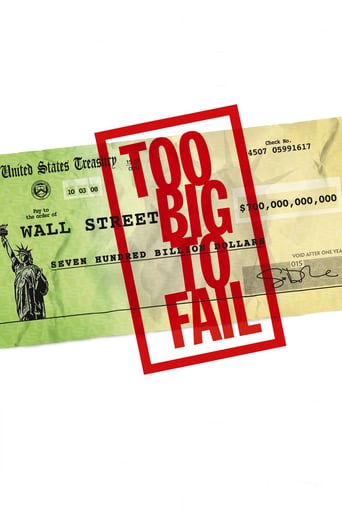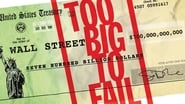toaksie
This was a fantastic view on the internal workings of the 2008 crisis. Not since the west wing have we seen such excellent political drama. It may not of been perfectly accurate in terms of how things took place but the humanization of tight dialogue of those involved displayed an intelligent and brilliant representation. This would have been a top class thriller if it wasn't so real. The calculated building of tension and the memory of how things took place left the viewer both shocked and tense at the knife edge that we were balancing upon, the relief short lived with the knowledge that we continue in a world where similar issues and the fallout are still so relevant.
Mac1958
As a financial adviser, I have two very different thoughts on "Too Big to Fail".First, I was fascinated by the human element - the relationships between decision-makers, the communication, the uncertainty, the failings and doubts we all possess. We all read the headlines, but rarely are we given even the slightest insight about the decision-making processes that affect us all.Second, and unfortunately, the story is told with such obvious omissions and distortions that it is clear writer Andrew Ross Sorkin not only carries a partisan grudge, but made little attempt to hide that grudge in the script. Just a few examples of many: 1. One clear "villain" of the meltdown was the American consumer - those who willingly purchased homes they quite well knew they couldn't afford, took advantage of 125% refi's to pay off credit cards so that they could run them up again, tapped into their equity for trips, cars, boats and other goodies, etc. Instead, they were clearly portrayed as victims, and the only time a reference is made to them is when the biggest villain in the film, Dick Fuld, is scoffing at them.2. Legislators Barney Frank and Chris Dodd, who are documented to have made errors in judgment leading up to the crisis, are portrayed as having absolutely nothing to do with it, completely stunned that this was happening - worse, they come off as passionate defenders of the people. Only someone who knows absolutely nothing of this crisis would fall for this. Come on, Mr. Sorkin.3. Then-SEC Chairman Christopher Cox, the highest-profile Republican in the story, is portrayed as a bumbling, indecisive, oafish fool. If the rest of the film were not so left-leaning, this portrayal may not have been so obvious. Instead, it falls right in line with the rest of the partisan approach.4. When assistant Michele Davis asks why regulators failed to notice and act upon the blatant problems in the mortgage industry, Hank Paulson sheepishly responds, "because we were making too much money." What?! The federal government failed to do its job because some people were making a lot of money? Wouldn't an indictment of such magnitude warrant a much larger inspection during this movie? Instead, it's just passed off as "greed". Astonishing.5. Blame for the entire economic meltdown is placed in one place, and one place only: Those Evil Banks. Not one ounce of blame (outside of the ridiculous statement in #4, above) is placed on the massive failure of regulators to do their job; on the consumers who willingly signed on the dotted line, on the bureaucrats from both parties who pushed Fannie Mae and Freddie Mac to make bad loans in the interest of "fairness." I could go on. In short, partisan politics (from BOTH sides) have so polluted our everyday culture that it's now impossible to believe anything you hear, read or see. "Too Big To Fail" is a vivid example.Here's the problem: This film had a chance to teach us critical lessons about the financial meltdown. An accurate approach could have served as a road map for the future, a warning siren to everyone from politicians to Wall Streeters to regular citizens on the dangers of personal greed, of poor political leadership and of the need for more effective regulation of financial markets.Instead, it's just another political statement disguised as "fact". What a shame..
jotix100
As we start watching this film, that plays like a documentary, we are given an introduction as to what caused the debacle in the United States economy system prior to the demise of the powerhouse Lehman Brothers. The US economy almost collapse because of the same people that became obscenely rich while the party was going on, were reluctant in fixing the main problem, as well as their responsibility in creating what led to its almost collapse. Unfortunately, after all was said and done, things remained the same because even though the government, led by then Treasury secretary Henry Paulson, decided to inject cash for the banks to continue lending money to the industries and businesses that depended on it, the little people that did not have the power of the more powerful elite to continue operating were the ones that suffered the most. On a positive note, the figure of Warren Buffet, the oracle of Omaha, comes out as the most level headed individual of all. He is a humble man when it comes to show off his wealth. In fact, the film shows him as the simple, unassuming person that he is. It is humbling for someone like Hank Paulson to seek advice from this great man that had a clear picture about the excesses the men at the center of the story had committed.Curtis Hanson directed the HBO film, based on a novel of Andrew Ross Sorkin, with a screenplay by Peter Gould. The high financing world is examined by the filmmakers, trying to make sense about the fateful year of 2008. The best thing they achieved was the almost perfect match in the casting to play on the screen the principals involved in the story. The film requires a certain knowledge to follow the intricacies of that world, something that is not easily grasped by the general public.William Hurt shines as Hank Paulson, the man at the center of the storm. We watch him walking up Seventh Avenue in Manhattan looking at what was Lehman Brothers' headquarters. Others in the film are Billy Crudup as Timothy Geithner. Paul Giamatti playing the bearded, and somber, Ben Bernanke. As Paulson's Treasury team there are wonderful performances by Cinthia Nixon, Joey Slotnick, Topher Grace and Ayan Akhtar. Almost all the other actors have only limited time in front of the camera, but their collective effort is notable.
bryanmillsfist
This story is subject to partisan prejudices as evidenced by another reviewer's assertion that the highly biased "Inside Job" is the "truth". To HBO's credit they resisted the temptation to use this sordid affair as a platform for opinion like Charles Ferguson did in "Inside Job". Instead they took a bare bones approach to the story. They give the viewer a summation of the events leading up to the government bailouts.This also hurts the story as character development is fairly shallow and the plot itself requires foreknowledge of the economic environment surrounding these events.Considering that these events occurred so recently any expectation that you will receive the complete story is unrealistic. Any person who thinks that the truth will be so quickly revealed is kidding themselves. There are facts that are still unknown that in time will be revealed. However, this movie does a good job of presenting the facts we do know in lay terms with resorting to the histrionics of propaganda films like "Inside Job".The actors do a solid job of portraying the individuals involved. There is no unnecessary depictions of personal foibles that do not in some way relate to the story. The acting is sober and fair,which is appropriate for this film's aim of presenting a factual narrative of the controversial events.Overall, I believe this movie to be a solid, objective, presentation of the financial mess of 2008. That some ideologues on IMDb object to that should not deter you. This movie is a good intro to what is a complex subject that requires far more then reading articles on the Internet to truly understand.






